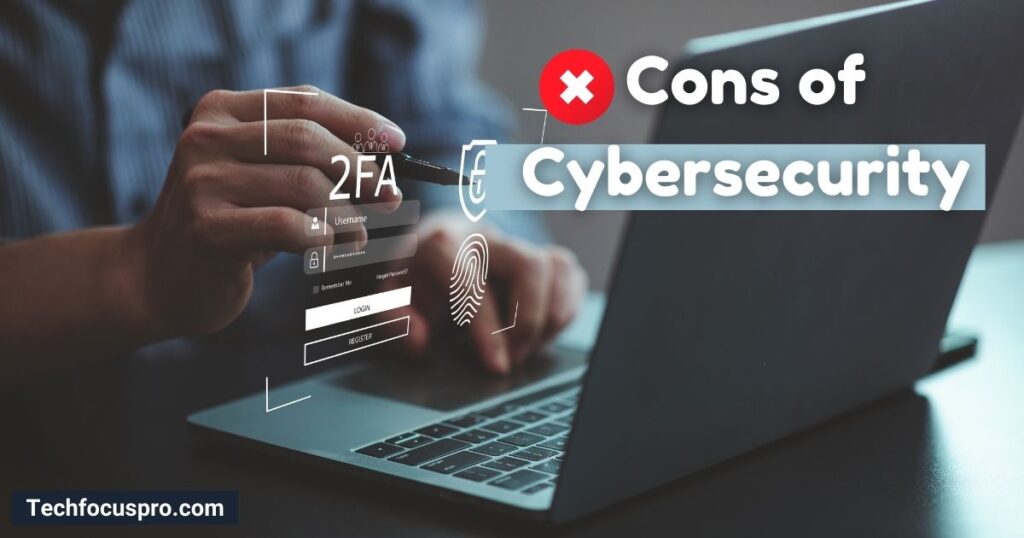What are the Cybersecurity Pros and Cons?

Cybersecurity’s main goal is to protect computers, networks, and data from interference and attacks. As the Internet connects our world, it is more dangerous than ever to shield our digital info.
The benefits of cybersecurity include the protection of personal data as well as business and individual records. However, there are also disadvantages, such as the high cost and possible privacy risks.
This guide will look at the Cybersecurity Pros and Cons to help you understand it and its challenges.
Importance of Cybersecurity in Today’s Digital World
Cybersecurity is crucial in the current digital era to safeguard our sensitive data. Since we use the Internet for practically everything these days, including banking and shopping, we are sharing more private information online than ever before.
Strong cybersecurity defenses are essential since hackers and other cybercriminals are always trying to find new ways to steal sensitive information. Credit card numbers and passwords are sensitive information that is readily accessible and misused if improperly protected.
A business that falls prey to a cyberattack may also suffer significant financial losses and damage to its reputation.
Consequently, investing in cybersecurity is necessary—not optional—to guarantee safety and trust in our digital lives.
What are the benefits of cyber security? Pros of Cybersecurity

While cybersecurity is essential, it comes with certain drawbacks. For instance, implementing strong cybersecurity measures can be expensive. The costs include buying advanced software, hiring skilled personnel, and continuous maintenance.
Small businesses might find these expenses especially challenging. Additionally, complex security protocols can impact productivity, as they might slow down systems or create hurdles for employees. There’s also the risk of over-reliance on technology, which can give an untrue sense of security.
Lastly, continually developing cyber threats mean that what works today might not be operative tomorrow and needs ongoing updates and training.
Protection Against Cyber Threats
Prevention of Unauthorized Access to Sensitive Data
One of the main benefits of cybersecurity is that it helps prevent unauthorized individuals from accessing your sensitive information. This means hackers and other cybercriminals can’t easily steal your personal or business data.
Safeguarding Against Malware, Ransomware, and Phishing Attacks
Cybersecurity measures protect against various types of online attacks, such as malware, which can damage your system; ransomware, which can lock you out of your data and demand payment; and phishing, where attackers trick you into revealing personal information.
Ensuring Data Integrity and Confidentiality
Cybersecurity ensures that your information remains unchanged and confidential. This means that only the right people can access this data, preventing unauthorized modifications and keeping your information private.
Business Continuity
Minimizing Downtime Caused by Cyber Incidents
Effective cybersecurity helps minimize the time your business is offline due to cyber incidents, allowing you to continue operations smoothly without major interruptions.
Enabling Quick Recovery from Attacks
Strong cybersecurity facilitates rapid recovery from attacks, ensuring that any disruptions are quickly managed and normal operations can be restored faster.
Ensuring Operational Resilience
Cybersecurity measures ensure that your business remains resilient and can continue functioning even in the face of cyber threats, maintaining productivity and stability.
Consumer Trust

Building Customer Confidence in Handling Their Data
When customers know that their data is well-protected, they feel more confident doing business with you. This trust can lead to stronger customer relationships and repeat business.
Enhancing Reputation and Brand Loyalty
Having strong cybersecurity practices enhances your reputation. Customers are likely to be more loyal to a brand that is known for taking their privacy and data security seriously.
Compliance with Data Protection Regulations, such as GDPR, CCPA
Cybersecurity ensures that you comply with important data protection laws, such as the General Data Protection Regulation (GDPR) and the California Consumer Privacy Act (CCPA), avoiding potential legal issues and fines.
Financial Protection
Reducing Costs Associated with Data Breaches and Cyber Attacks
Investing in cybersecurity can save you money in the long run by preventing data breaches and cyber-attacks and thus avoiding the associated costs of these incidents.
Avoiding Fines and Legal Fees
Compliance with cybersecurity laws and regulations can help you avoid the hefty fines and legal fees that can arise from breaches and data mishandling.
Lowering Insurance Premiums Through Robust Cybersecurity Measures
Insurance companies might lower your premiums if you have strong cybersecurity measures in place, reducing your overall insurance costs.
What are the Disadvantages of Cybersecurity? Cons of Cybersecurity

High Costs
Initial Setup and Ongoing Maintenance Expenses
Implementing strong cybersecurity measures can be very expensive. You will need to invest in the initial setup and continuously maintain and update the security systems. This can be a significant financial burden, especially for smaller businesses.
Cost of Acquiring and Updating Advanced Security Tools
Advanced security tools are crucial to fend off sophisticated cyber threats. However, these tools often come with a high price tag. Additionally, they need regular updates to stay effective, which incurs further costs.
Need for Regular Training and Hiring Skilled Personnel
To keep up with evolving cyber threats, you must regularly train your existing employees and potentially hire new, skilled cybersecurity professionals. This adds to the overall expense and can be tough for businesses with limited budgets.
Complexity
Implementation and Management Challenges
Implementing and managing cybersecurity measures can be complex. It requires a deep understanding of the technology and careful planning to ensure that all areas are covered effectively. Mistakes in implementation can leave gaps that cybercriminals can exploit.
Integration with Existing Systems and Processes
Integrating new cybersecurity measures with your existing systems and processes can be challenging. Modifications to ensure that the new systems work seamlessly with the old can be time-consuming and costly.
Maintaining Up-to-Date Security Measures to Counter Evolving Threats
Cyber threats are always changing. Keeping your security measures up-to-date to counter these evolving threats requires continuous effort and resources, making it a never-ending challenge.
Potential for Over-Reliance

False Sense of Security Leading to Complacency
Having healthy cybersecurity measures in place might give an untrue sense of security, leading to satisfaction. It is vital to remain attentive and continuously measure the efficiency of your security practices rather than assuming you are fully protected.
Dependence on Technology Without Fostering Cybersecurity Awareness Among Employees
Trusting severely on technology can lead to staying on employee training and consciousness. Human error is often a weak link in security; therefore, the development of a culture of cybersecurity awareness is as vital as the technology itself.
Possible Neglect of Physical Security Aspects
Focusing too much on digital security can sometimes lead to neglect of physical security, such as securing access to physical servers and devices. Both digital and physical security are essential to comprehensive protection.
Privacy Concerns
Intrusive Monitoring and Surveillance Practices
Robust cybersecurity often involves monitoring and surveillance, which can be intrusive. Employees and users may feel their privacy is being invaded, potentially leading to dissatisfaction and trust issues.
Potential Misuse of Security Measures for Data Collection
There is a danger that cybersecurity actions can be misused for data collection outside their projected purpose, raising ethical and legal worries about how the collected data is handled.
Balancing Security Needs with Individuals’ Right to Privacy
Finding the right balance between effective security measures and respecting individuals’ privacy rights is stimulating. Excessively invasive measures can infringe on personal privacy, while under-protective measures can leave systems susceptible to attacks.
Conclusion
Protecting intimate data, maintaining client confidence, and obeying legal necessities all depend deeply on cybersecurity. Strong cybersecurity measures are vital for defending your company’s operations and status in a world where cyber fears are always developing.
Cybersecurity has drawbacks despite its many, such as lowering legal risks and protecting against data breaches. These include the high arrangement and maintenance expenses, the difficulty of implementation, and the vital ongoing training and updates. By considering the advantages and disadvantages, businesses can better appreciate the value of investing in cybersecurity and the associated responsibilities.






